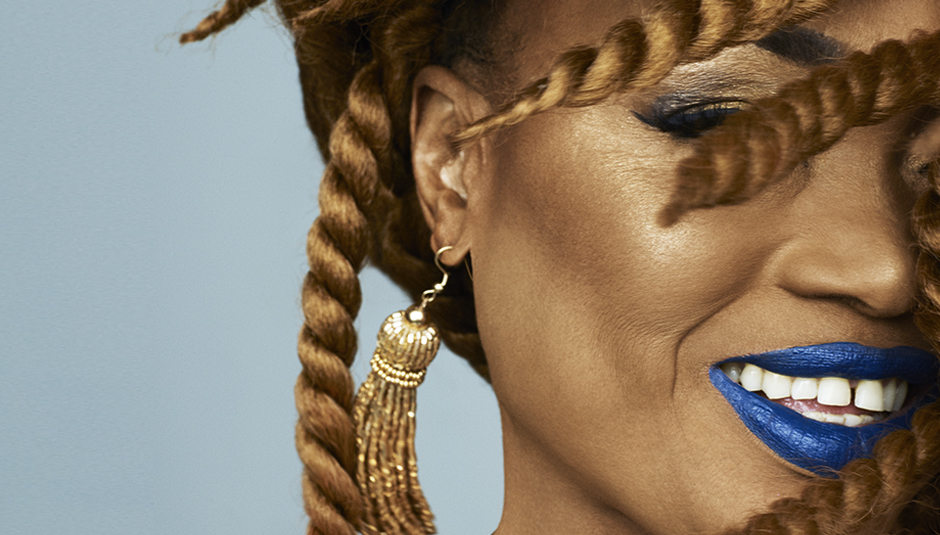Diva is a word often snuck into descriptions of female artists. From its original Italian origin, meaning goddess, the term has morphed into derogatory expression used against women often when they achieve success. Undoubtedly, there are a number of prima donnas out there who deserve to be shot down for brattish behaviour, but more often than not its use is unnecessarily spiteful. Read anything about Oumou Sangaré and it’s a title she’s often landed with, and whilst I don’t imagine its use is intended to reflect the more modern associations of the word in most cases, any unintended yet nonetheless unavoidable implications are a world away from what I encounter when I arrive to interview the Malian singer at the Grande Halle De La Villette in Paris.
Whether you’re familiar with her music or not I’d wager most could get a good sense of what she’s about from just a few moments in her presence. In my case, that was prior to our interview, as I watched her soundcheck for the gig she was to play at the Parisian venue that evening. It’s a presence that is strong and demanding of your attention. As she rolls through a variety of numbers she consults with various members of the band in a warm and unfussy fashion. It’s minus drama or histrionics, but full of intoxicating music. Off the back of about 20 minutes observation I rather arrogantly surmise that Sangaré is a tough, warm, and open person who I’m pretty sure can call bullshit a mile away.
For all my character sleuthing, the reason I’m here, and also why this hall will fill with people this evening, is the music. For the uninitiated, Sangare is one of Mali’s greatest exports. Having had a difficult early life that saw her father leave their family when she was only two to take up another wife and children, the young Sangaré began singing on the streets to help her mother feed the family. She released her debut record, Moussoulou (Women), in 1990 and since then has forged a career that has seen her star rise to become possibly Mali’s greatest living and most famous female singer. Also known as ‘The Songbird of Wassoulou’ (after the region south of the Niger river where she was raised) on account of her striking voice, her music, whilst traditional, has always been thematically quite radical.
In her own words, related to me through our translator Oliver – who remains infinitely patient throughout, in spite of my often incoherent and rambling questions – her music is: “Malian music from Wassoulou. Technically speaking it’s traditional music, but you can find a bit of everything in it. The Americans, particularly, tend to decide that it’s funk. Yes, it is technically traditional, but it’s been modernised over time. Most of the people that think it's more jazz, or blues, or funk…well, guess where blues is from? Guess where jazz is from? Guess where funk is from?”
As is so often the case during the interview, Sangaré is passionately protective of the origins and traditionality of her music – no doubt quite rightly, given the rise in the appropriation of other cultures’ music by western musicians. But interestingly her new record, Mogoya, does embrace a musical modernity like never before. Any suggestion that she’s gone electric – a la Dylan – or transformed her music in some way is swiftly debunked. “I don’t like the word change because the subtext is that it’s a bit too radical, which is not the case here.” Her rejection of the idea that her music is in any way radical is an interesting one, as certainly lyrically it is often very progressive.
Time and time again Sangaré has raised the issue of women’s rights in her music. She has railed against the polygamy and child marriage that was once commonplace in her native country, but the more I talk to her this seemingly incongruous mix of protectionism and reformism apparent in her views make absolute sense.
Whilst she is careful with the musicality of her work when it comes to the issues that inspire her, she shows no such restraint. “I’ve always been very, very outspoken. I listen around and hear what people are talking about. The main problem, and my view, is that nowadays relationships between humans, whether it’s individuals, groups, or countries, are just going down the drain. The wars, the betrayals, the this, the that. So I think maybe it’s time I say something about it. Because I’ve always had this thing where I have to say things, which is why most of my compositions are on a certain topic – it’s never just ‘I was walking down the street’. Something’s going on in a sense that war and violence – whether it’s emotional or factual violence – always seem to be taking over love, which could potentially be its opposite. So let’s talk about it.”
And talk about it she does throughout Mogoya. On ‘Kamelemba’ she returns to gender issues on a song that acts as a warning shot to young girls about men with less-than-desirable intentions. Speaking from within a culture that has historically supported the practice of polygamy and child marriage, one can’t imagine standing up to such inequalities is done without risk of retribution. But Sangaré is cautiously steadfast in her convictions. “It’s really not easy because everybody is looking at you, everybody is scrutinising what you do. So you have much less right to make a mistake than if you were not who you are. It’s tiring, but you’ve got to be focused and be careful about it. There doesn’t seem to have been a significant backlash on any particular topic.”
Happily, despite still feeling compelled to return to the issue, she is confident that progress is being made. “It’s going much, much better than it used to. Access to education is much better than before, you see fewer and fewer arranged marriages than you would have seen 25 years ago. People are realising it by themselves, but I have set an example not only speaking up but also acting.”
She’s referring not to her music, but the multiple businesses she also owns and runs, including a range of SUVs called ‘Oum-Sang’, a hotel in Bamako, and ‘Oumou Sangaré Rice’, grown in her own fields. She believes the extraordinary range of ventures she commits herself to sets an important precedent for women in Mali. “I’m not teaching the country they can do this, it’s just an example. But it’s a very large example, a very prominent example. And if I can do it, other people can do it, and people are starting to do it. You’re now seeing women everywhere, in many, many places where you wouldn't have seen them even 10 or 15 years ago. So it has changed a lot.”
Just as she is protective of the traditional foundations of her music, she displays a striking level of autonomy in everything she does. Oliver tells me that she visited the SUV plants in China herself to select her chosen model, and whilst there she checked out a few cassette factories in search of a good deal. He also tells me of a time he was with her at a market in Bamako, and she tore a strip off a trader for selling pirate copies of her albums. It’s a fierce independence that extends to her music. “I always work on my own, always write by myself. It’s always been me.”
But it’s clear that this extreme self-reliance isn’t founded on ego, but rather a sharp sense of accountability. When I ask her about the UNESCO prize she was awarded in 2001, she speaks of feeling both honoured and burdened by it, unaware that anyone was paying that degree of attention to what she was doing. And when I suggest she is one of the key figures in the rise in popularity of Malian music, I'm quickly corrected. “I will not take credit for extending the reach of Malian music worldwide. Salif Keita and Ali Farka Touré are the ones that really opened the door, and I just shoved my foot in it then went my own way. I will not say that I am amongst those people. I mean, I have helped, but I will not say: ‘I did it along with this other couple of people.’ There was an occasion and I took advantage of it.”
She is equally aware that no one gets anywhere alone. Her latest record features a beautiful tribute to her mother, Aminata Diakité, who was also a singer. In the song, she describes her as a lioness who, despite her suffering, remained dignified and generous. She speaks to me about the influence she had on her burgeoning career. “I don't think I would have gotten very far if it wasn’t for my mother shielding me from a lot of influences and people. She counseled me, but mostly it was about protecting me because back in the day, it was really not well regarded to be a woman and a singer, especially if you start as a kid, and I started very, very young. It helped me in the sense that my mother was there, and properly taking care of me.”
Sangaré doesn’t wear her success lightly. She carries a huge sense of responsibility within her work that acknowledges the importance of traditions, Malian masters like Keita and Farka Touré, and her own history. But she is by no means a retrograde museum of Malian sound, hence the evolution of her music. She wants to appeal to Mali's youth, for it is they who will feel the real benefit of her message. Equally, she is not exclusively inward-looking; she’s collaborated with western musicians like Alicia Keys and Tracey Chapman and is keen to support Malian music as an export. “The western world, broadly speaking, is rich, but Mali is rich in its own way – mostly with culture. It’s a very nice way of being not an ambassador, but of going around and saying what you have to say with your own rhythms and your own music.”
I’m keen to hear her thoughts on projects like Damon Albarn’s Africa Express project, given her desire to spread her country’s music paired with her strong need to protect it. Unsurprisingly, she is in favour of a confluence of cultures, but it comes with the caveat that the origins should be retained. “The mix of culture and races is very important – that’s how you learn from one another – but it’s important not to forget where the music came from originally. You can breed it with other types of stuff, but at some point, you have to remember what it was originally, and not morph it and change it so much that it becomes something completely bland. Then you then have no idea of what it was originally.”
Her fine balance of honouring tradition and embracing the future is on full display when she takes the stage at the Grande Halle. Parisian teenagers rub shoulders with middle-aged men and women, and one young girl proudly tells me she shares her first name with Sangaré, and breathlessly enthuses about her hero. The unifying factor is the lady herself and the rapturous response she gets. It’s a performance that’s a perfect precis of Sangaré’s music: songs that often deal with deeply troubling issues are delivered with energy, passion, and joy. It is her talent that she can transform a song about suicide, ‘Yere Faga’ – which features the unmistakable Tony Allen on drums – into an anthem of such positive force. The authenticity of feeling is, as she explains, a result of experience. “What I’m singing about I’ve actually lived, and it really comes from the heart.”
She may have too much humility to admit it, but I’d argue her place amongst Mali’s greatest musicians is guaranteed. And such triumph in the face of adversity is an extraordinary thing to witness. “Suffering either kills you, disables you, or makes you very, very strong. I tipped on the side of strength.”
Mogoya will be released on 19 May via Nø Førmat! Oumou Sangaré plays London's Village Underground on 17 May; tickets can be purchased here. For more information about the singer, please click here.























